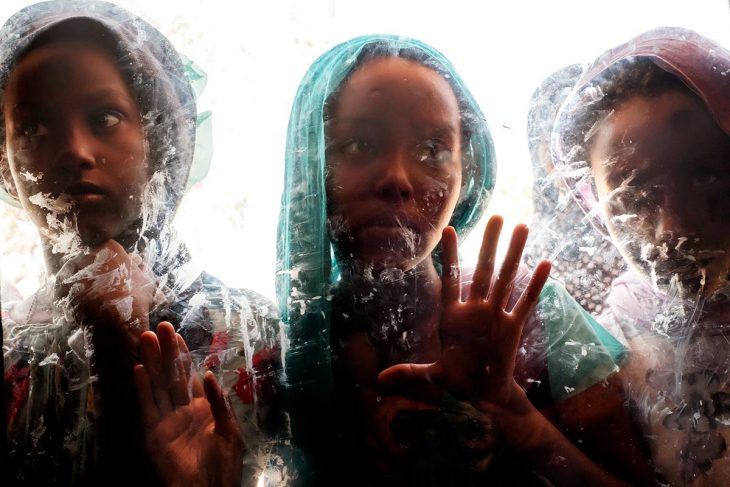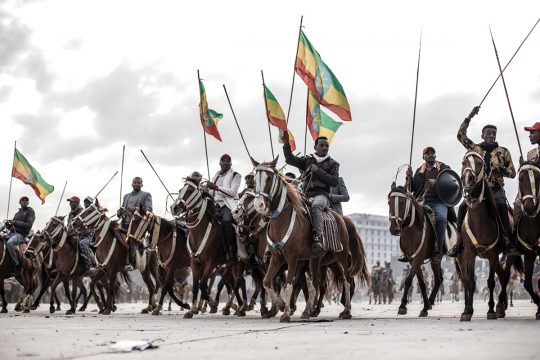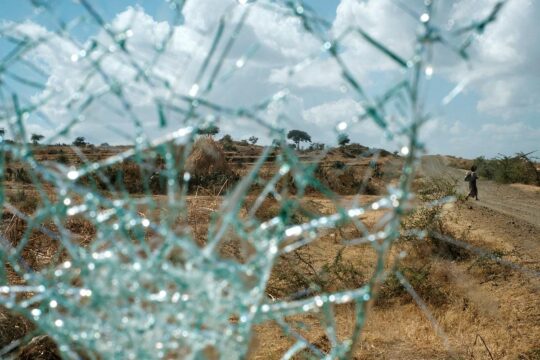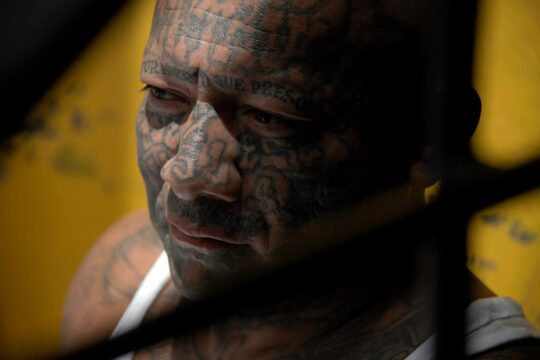The government’s January initiative on transitional justice is a good first step, as Ethiopia is in urgent need of justice and reconciliation, says Tadesse Simie Metekia, an Ethiopian expert on international crimes and transitional justice. But “I'm not sure if the country is ready to implement any form of transitional justice in a manner that is acceptable to the majority of Ethiopians or in a way that complies with international standards,” he adds.
Ethiopia is emerging from a brutal two-year war fought mainly between the federal government and the Tigray region in the country’s north, led by the Tigray People’s Liberation Front (TPLF). Eritrean forces were also involved on the government side, as well as militias, notably in the Amhara region. Up to 600,000 people are estimated to have been killed in two years, with thousands displaced or pushed into exile. A government blockade on Tigray deprived its people of food and essential services, leaving much of the population in need of humanitarian aid. There were allegations of rape, torture and other atrocities on both sides of the conflict, which the UN Commission of Experts on Ethiopia said could amount to war crimes and crimes against humanity.
Peace AND justice?
The November 2, 2022 Peace Agreement between the government and the TPLF signed in Pretoria under the auspices of the African Union seems to be holding for now, says William Davison, senior Ethiopia analyst at the International Crisis Group (ICG). Eritrean troops have also withdrawn from most areas of Tigray, he told Justice Info, but “not entirely”.
The agreement says that “the government of Ethiopia shall implement a comprehensive national transitional justice policy aimed at accountability, ascertaining the truth, redress for victims, reconciliation, and healing, consistent with the Constitution of FDRE [Federal Democratic Republic of Ethiopia] and the African Union Transitional Justice Policy Framework.” It also says that it “shall be developed with inputs from all stakeholders and civil society groups through public consultations and formal national policy-making processes”.
Another Truth Commission?
According to Metekia, the government says it will use the “Policy Options for Transitional Justice” document published in January for a public awareness and consultation campaign across the country from mid-March to the beginning of June. He thinks that time frame is too short, given the enormity of the task and resources needed.
This document, drawn up by a group of experts commissioned by the Ethiopian Ministry of Justice, looks at various options. As for who should be in charge, it suggests either existing institutions (but they would need reforming, it says) or a new institution such as a Truth Commission (but a previous commission set up by the current government in 2018 is perceived to ended without meaningful results). It points out that previous transitional justice efforts in Ethiopia have failed [see box], and that lessons should be learned.
“More than just lip service”
“The key ingredient here, as so often, is political will,” Davison tells Justice Info. “It seems that the Reconciliation Commission established a couple of years ago didn't really receive political support and adequate financing, which contributed to it having a very minimal impact. New processes would need much more political support. And at the moment, I think there's a question mark about whether that's going to be forthcoming.”
Davison thinks the independence of the Ethiopian judiciary is also an issue, especially when it comes to judging top political and military leaders. The signatories to the peace agreement may well be accused of crimes, he warns, so they may well be wary of independent justice.
Metekia would like to give the government the benefit of the doubt. “I would say this is something more than just lip service,” he tells Justice Info. “The Ethiopian government has made a significant step in drafting a policy document, and preparing consultations. I have reservations, but for me, this is something that everyone should encourage and support.”
Insecurity in many parts of the country, and conflicts in other regions as well as Tigray, will also be a challenge. “There are other conflicts in Ethiopia, particularly in Oromia, and there is also a set of historic grievances about past injustices from across the country, from various different communities and political entities, which say they have not been addressed,” says Davison. Metekia says women and girls must be involved in the transitional justice process, an aspect stressed by UN experts on Ethiopia.
UN commission kept out
Ethiopia will need international support in the form of financing and expertise. But the way this is done is sensitive. “It is important that the process is a nationally owned one, and international actors, donors and experts should be able to respect that, for the government to push this forward and for Ethiopians to see it as a home-grown solution,” says Metekia.
In the meantime, the government has refused access to areas outside the capital for the UN’s Commission of Human Rights Experts on Ethiopia, accusing it of “inflammatory rhetoric”. This issue will likely come up at the current session of the UN Human Rights Council in Geneva, where that commission will present a report. The Ethiopian government rejected the commission’s preliminary report to the Human Rights Council last September which points to possible war crimes and crimes against humanity in the Tigray war, including by the federal government.
The Eritrea factor
And then, there is another elephant in the room: Eritrea. Ethiopia’s northern neighbour is accused of some of the worst atrocities in Tigray, including killing and raping civilians. Eritrea is not a signatory to the peace deal, and its own record on justice and human rights is one of the worst in the world. Its long-time president Isaias Afwerki denies allegations of serious crimes committed by his troops in Ethiopia, calling them “fantasy”.
“There is no real prospect of Eritrean national processes to hold to account anyone for those types of crimes,” says Davison, “and there's little prospect of an international judicial mechanism being applicable to Eritrea in practice.”
ETHIOPIA’S PAST FAILURES ON TRANSITIONAL JUSTICE
The Derg military junta (1974-1991) that overthrew the imperial regime detained ministers, officials and others accused of committing injustice and corruption, and were also allegedly responsible for the Wollo famine. The junta established a Commission of Inquiry to investigate but summarily executed 60 officials before the commission could complete its work. The Derg regime itself was responsible for mass atrocities, known as the “Red Terror”.
The Ethiopian People’s Revolutionary Democratic Front government (1991-2018) that took over after the fall of the Derg set up a Special Prosecutor Office, which investigated former civilian and military Derg officials - including the country’s former president Mengistu Hailemariam (still in exile in Zimbabwe). They were convicted and sentenced for serious crimes, including genocide. However, this process was widely seen as “victors’ justice”.
When current Prime Minister Abiy Ahmed took office in 2018, his government took a number of steps to address past injustices and serious human rights violations, including setting up a Reconciliation Commission. This commission was given a mandate to assess, identify and acknowledge gross human rights violations, injustices, grievances and failures, and build sustainable peace and democracy based on reconciliation. However, the Commission’s three-year operational term expired in February 2022, without results.
Source: “Policy Options for Transitional Justice” (government-commissioned working group, January 2023).








